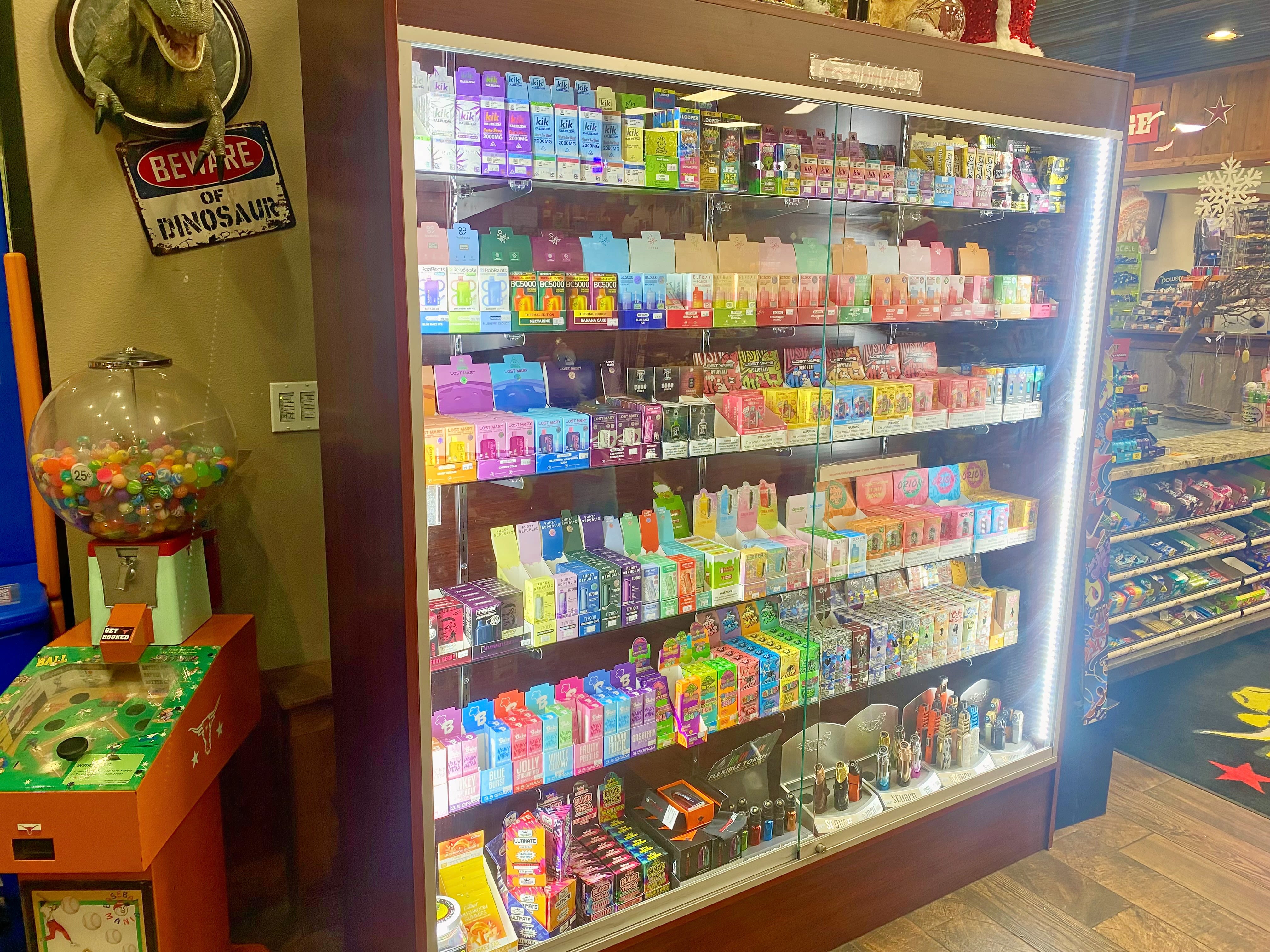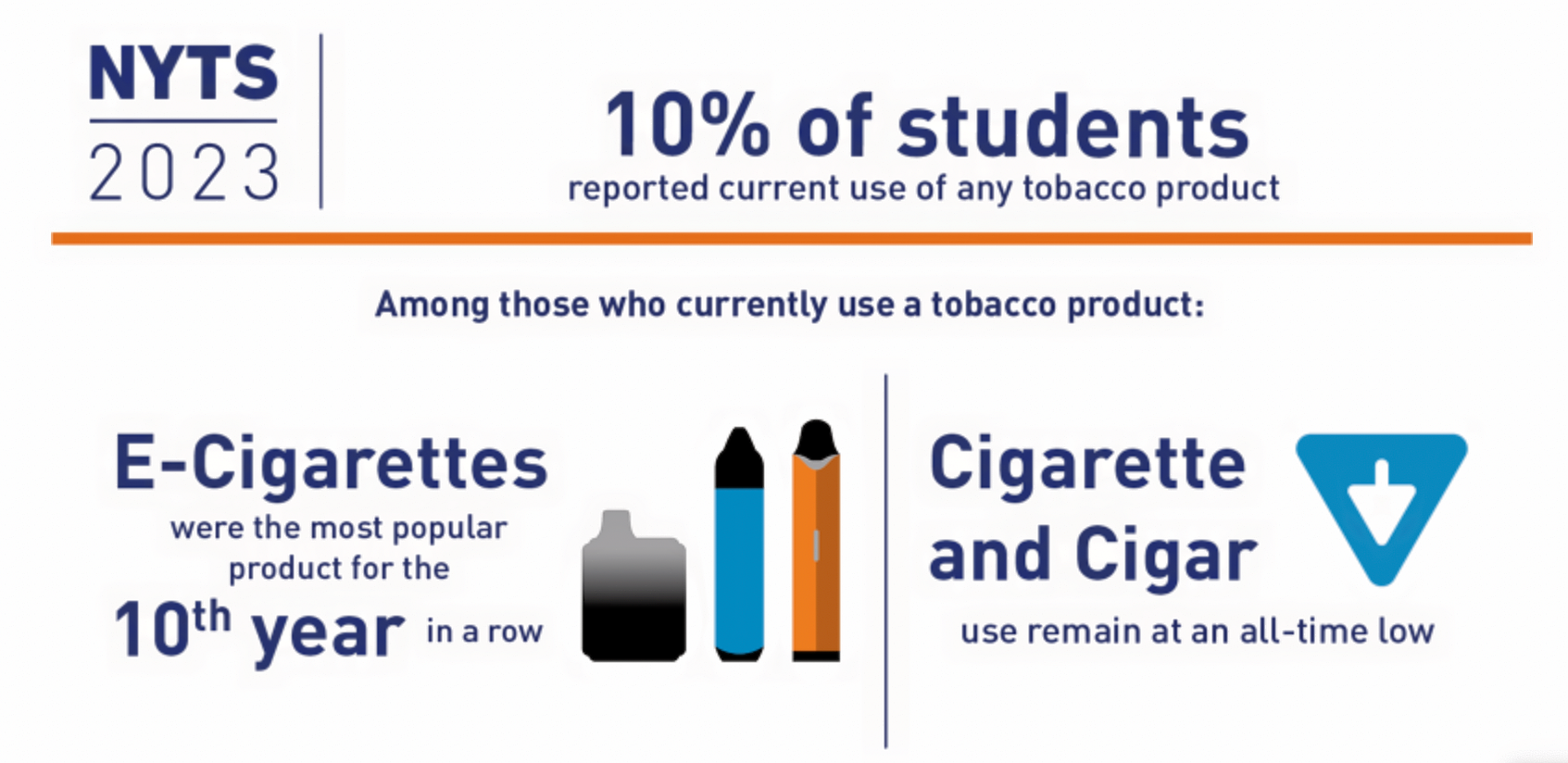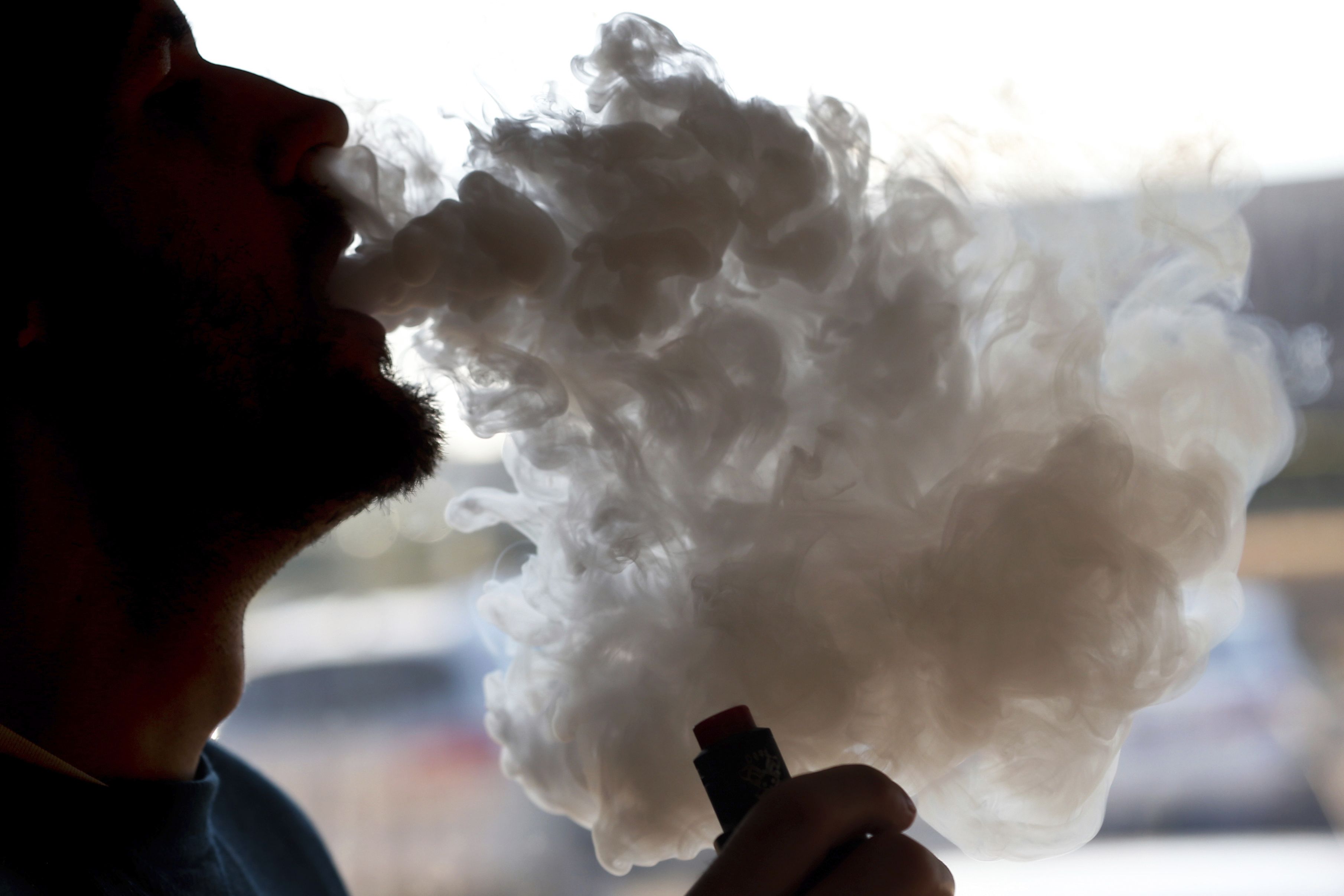Vaping makes a comeback

Less than two years after the FDA’s ban on JUUL vaping devices, a new manufacturer of liquid nicotine has emerged. Products with names such as Elf Bar, Funky Republic and Lost Mary line the shelves of smoke shops. They have claimed the market share left open by the government's 2021 decision to ban JUULs, at the time the most popular brand.
The San Francisco-based company is no longer allowed to sell flavored pods. But Elf offers new colorful devices that hold flavored pods of nicotine with names such as Rainbow Candy, Miami Mint and Banana Cake.
“I like how cute it looks and the taste of it. It’s silver with hot pink letters which is appealing to look at,” said a sophomore political science major, who has asked not to be identified.
Case of vaping devices. (Jaida Joyner/Staff Writer)
Case of vaping devices. (Jaida Joyner/Staff Writer)
An Elf Bar disposable vaping pod device is displayed. The number of electronic cigarette devices sold in the U.S. has nearly tripled since 2020, driven almost entirely by a wave of unauthorized disposable vapes from China, according to sales data obtained by the Associated Press. Recently U.S. health regulators have begun trying to block imports of several of the biggest brands, including Elf Bar and Esco Bar. (AP Photo/Andrew Harnik)
An Elf Bar disposable vaping pod device is displayed. The number of electronic cigarette devices sold in the U.S. has nearly tripled since 2020, driven almost entirely by a wave of unauthorized disposable vapes from China, according to sales data obtained by the Associated Press. Recently U.S. health regulators have begun trying to block imports of several of the biggest brands, including Elf Bar and Esco Bar. (AP Photo/Andrew Harnik)
Vaping emerged as a smoking option in 2003 as cigarettes continued to lose favor after years of federal regulation. Today, it is the preferred method of smoking for Generation Z — teens and young adults.
In 2023, approximately one out of every 22 middle school students and one out of every 10 high school students have engaged in e-cigarette use within the last 30 days, according to the latest data from the Centers for Disease Control and Prevention.
“It’s just the newest addiction out there and it is hard to stop. Teens that vape are at increased risk of later drug use as well,” said Cook Children’s Medical Doctor, Katherine Schultz.
Chart courtesy of U.S. Food and Drug Administration.
Chart courtesy of U.S. Food and Drug Administration.
While the health consequences of smoking are often long-term, medical officials blamed vaping for a rash of respiratory illnesses in 2020 when the CDC reported that over 2,000 children faced death or were hospitalized suffering the consequences of a collapsed lung attributed to vaping.
The Cook Children’s Checkup Newsroom reported in 2019 that a 17-year-old patient, Tryston, was admitted to Cook Children’s Hospital and suffered severe health consequences due to vaping. Initially, he experienced fatigue and weight loss, and his condition rapidly worsened, leading to breathing difficulties, chest pain and hospitalization.
Despite extensive medical efforts, including intubation and a lung biopsy, the exact cause of his illness remained unclear.
Tryston had a history of vaping.
He stayed in the hospital for 18 days, resulting in weight loss, muscle atrophy and other ongoing health issues. While the exact trigger for his lung failure was not conclusively identified, medical professionals believe that vaping likely played a significant role.
“Honestly, we might not understand all of the risks for a long time. It took 50 years for people to realize that smoking is bad for you. Chronic cough is probably the most obvious symptom. Excessive use can cause nausea and headaches. [Other] things that we do know: worsens lung function and increases blood pressure which is associated with heart complications,” Schultz said.
Image of Tryston courtesy of Cook Children's Hospital.
Image of Tryston courtesy of Cook Children's Hospital.
Image of Tryston courtesy of Cook Children's Hospital.
Image of Tryston courtesy of Cook Children's Hospital.
Image of Tryston courtesy of Cook Children's Hospital.
Image of Tryston courtesy of Cook Children's Hospital.
Image of Tryston courtesy of Cook Children's Hospital.
Image of Tryston courtesy of Cook Children's Hospital.
Image of Tryston courtesy of Cook Children's Hospital.
Image of Tryston courtesy of Cook Children's Hospital.
A sponge saturated with 40mg of liquid nicotine equates to the consumption of one or two packs of 20 cigarettes. However, in the case of an illicit vape, the contents are not minimized and may hold a larger volume of e-liquid surpassing the legally permitted limits.
Manufactured in China, Elf is considered contraband in the U.S. but that has not stopped people from accessing the product. Notably, the F.D.A. Import Alert 98-06 stipulates that all Elf contraband should be extracted at the border.
While the company asserts that Elf Bar usage is intended for adults aged 21 and above, critics contend that the product is being marketed towards younger demographics, such as Gen Z and Gen Alpha, citing its vibrant minimalist aesthetic as evidence.
The increase of these new gadgets on college campuses has witnessed rapid growth. There are four smoke shops within a one-mile radius of TCU’s campus, with one of them in walking distance that is also placed directly across from Paschal High School in Fort Worth.
Red pins on map indicate smoke shops within 1 mile of TCU's Campus and Paschal High School.

“Honestly I bought one just yesterday because it was hot pink and the flavor sounded good,” like all of the students quoted in this story, the sophomore strategic communication major asked not to be identified.
The rise of vaping has created a new narrative within a supposedly tobacco-free university, where a smog of modernization is reshaping the very air students breathe. The youthful appearance of this redesigned device has appealed to younger audiences due to its playful and toy-like aesthetic.
Under the nose of a nicotine-free policy, a subculture is brewing, leaving campus administration grappling with fumes of uncertainty and an unexpected haze of challenges.

TCU's policy, as outlined on the Campus Recreation and Wellness Promotion website, prohibits the use of all tobacco products and smoking on TCU-owned property.
This includes cigars, cigarettes, chewing tobacco, snuff, e-cigarettes/vapes, and hookahs. Additionally, electronic delivery devices (e-cigs, vapes, JUULs, e-hookahs, vape pens, and ENDS) are not allowed in residence halls, regardless of the owner's age.
The policy applies to all individuals on campus, including students, faculty, staff, and guests, and extends to all programs and sporting events hosted on campus.
But teens lured by vaping's popularity and the idea that it's trendy and normal, can arrive on campus already addicted to nicotine.
“It’s a norm on a college campus," said a student who didn't want to be identified as a vaper. "It starts out with it being a casual habit but vapes are addictive making it a necessity to many college students making them go against the rules in place.”

Navigating the landscape of youth culture among Gen Z various trends emerge that can be classified as good or bad. However, the impact vaping has on this generation has severely negative health implications.
The fate of Elf Bar remains uncertain, with questions lingering about whether the company will thrive or face a ban akin to its counterpart, JUUL.
Richmonder Coleman Wheeler emits a cloud of smoke from a vape pipe at a local vape shop in Richmond, Va., Friday, Jan. 18, 2019. Tobacco-friendly Virginia is preparing to raise the age limit on buying traditional and electric cigarettes from 18 to 21. (AP Photo/Steve Helber)
Richmonder Coleman Wheeler emits a cloud of smoke from a vape pipe at a local vape shop in Richmond, Va., Friday, Jan. 18, 2019. Tobacco-friendly Virginia is preparing to raise the age limit on buying traditional and electric cigarettes from 18 to 21. (AP Photo/Steve Helber)




